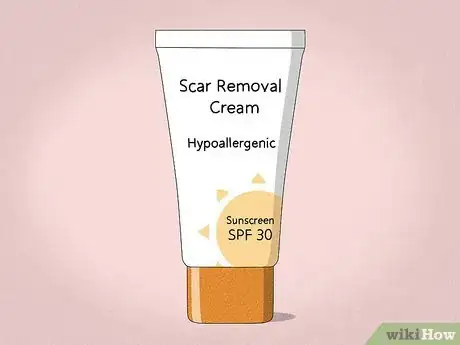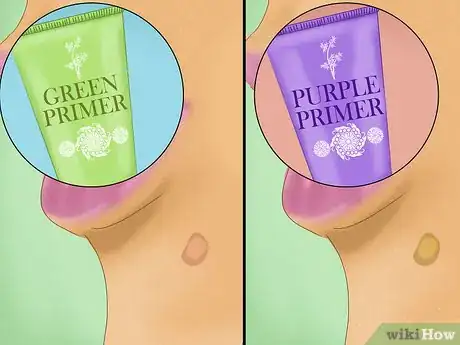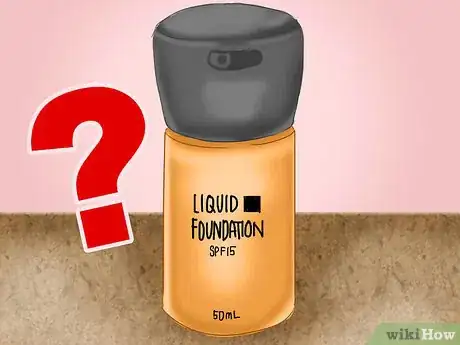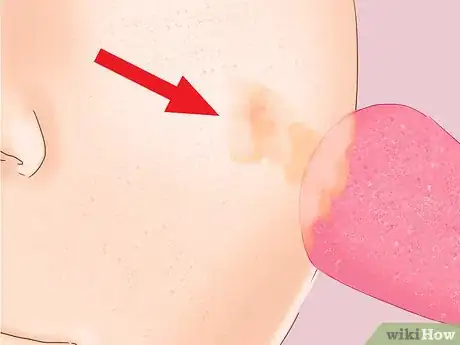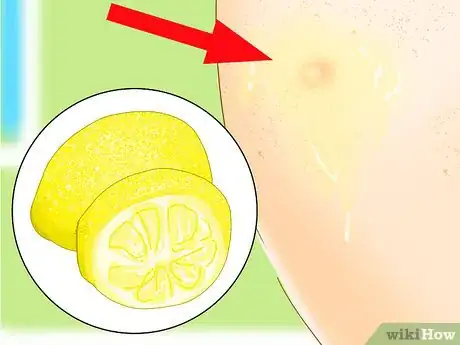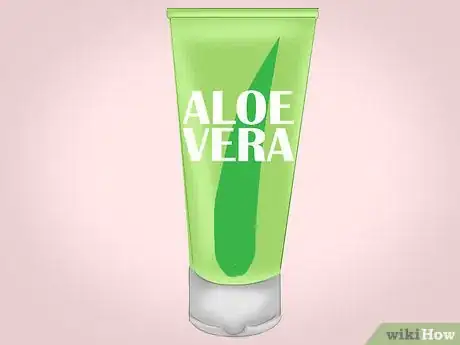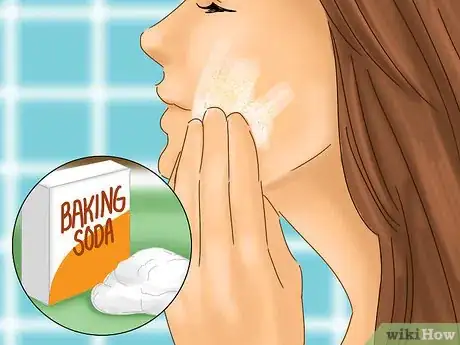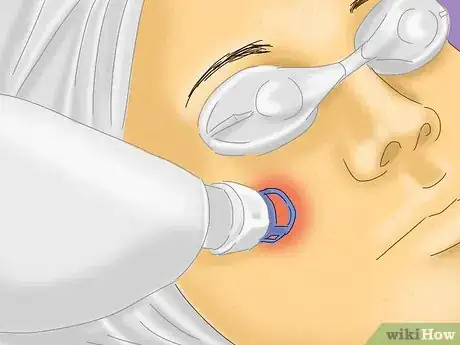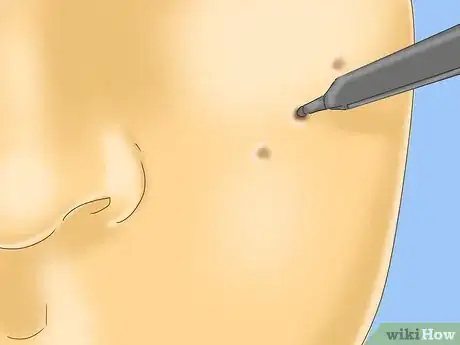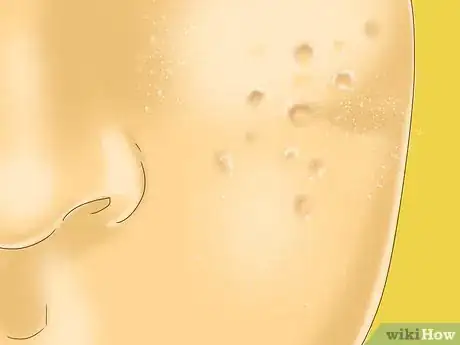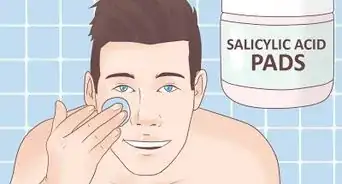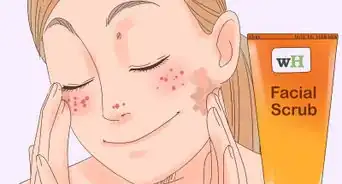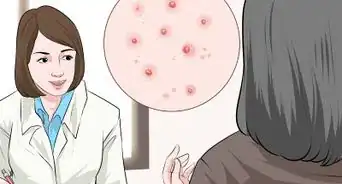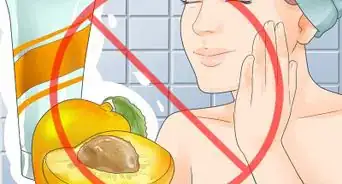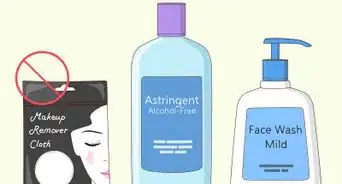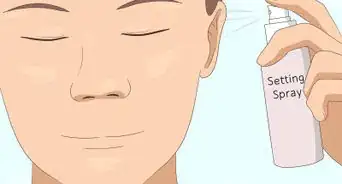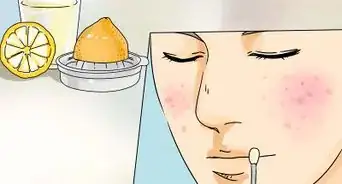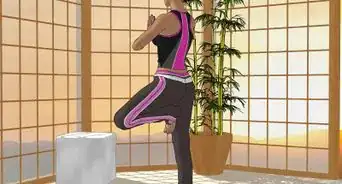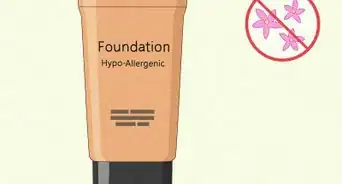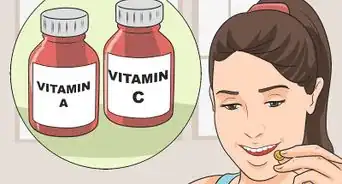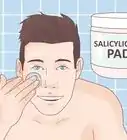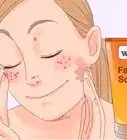This article was medically reviewed by Mohiba Tareen, MD. Mohiba Tareen is a board certified Dermatologist and the founder of Tareen Dermatology located in Roseville, Maplewood and Faribault, Minnesota. Dr. Tareen completed medical school at the University of Michigan in Ann Arbor, where she was inducted into the prestigious Alpha Omega Alpha honor society. While a dermatology resident at Columbia University in New York City, she won the Conrad Stritzler award of the New York Dermatologic Society and was published in The New England Journal of Medicine. Dr. Tareen then completed a procedural fellowship which focused on dermatologic surgery, laser, and cosmetic dermatology.
There are 14 references cited in this article, which can be found at the bottom of the page.
This article has been viewed 358,921 times.
Acne is a condition that occurs when hair follicles become plugged with oil and dead skin cells. When the plug is formed, bacteria can thrive, which results in inflammation. The result is whiteheads, blackheads, pimples, small or large painful bumps beneath the skin’s surface, or even cystic lesions. Acne mostly occurs on the face, neck, chest, back, and shoulders and is generally most prevalent during the teen years. One of the worst things about acne, is that even after it has cleared, it often leaves acne marks or scars. These marks and scars can be especially distressing when they occur on your face. Whether you end up with acne marks or scars typically depends on the severity of your acne. An acne mark is a red or brownish mark left on your face after a pimple resolves. This mark will usually fade on its own, but may take 12 months or more. Acne scars are the deep pits and indentations left after more severe inflammatory acne. There are ways you can deal with problematic acne marks and scars. You can take preventive measures, cover them using camouflage makeup, lighten or fade them with natural remedies, or have them medically treated. If acne marks and scars are a continuous, distressing issue for you, talk to your doctor.
Steps
Applying Camouflage Makeup
-
1Look for a scar removal formula. There are many scar removal products available that may help to reduce the appearance of acne scars. You can apply these before you apply your makeup. For best results, look for a product that:
- Contains sunscreen, to protect your skin from sun damage.
- Hypoallergenic, to reduce the chance of an allergic reaction.
- Non-comedogenic, so it won’t clog your pores and give you an acne outbreak.
- Contains extra ingredients to help reduce the appearance of scars, such as vitamin C, kojic acid, arbutin (also known as bearberry extract), or licorice.[1]
-
2Use color theory to hide individual scars. Take a close look at your scars under bright light and examine what colors they have and how they differ from the rest of your skin. You can make them less obvious by applying the opposite color.
- For example, you can neutralize a red scar with a touch of green concealer, hide a purple blemish with a tiny bit of yellow, or make raised scars look smoother, by shading them slightly darker than the surrounding skin. This will make them appear to stand out less.
- Brands that work well for acne scars include: Kryolan Concealer Wheel, Ben Nye Concealer Cover-All Wheel, Laura Geller Real Deal Concealer and Clinique Even Better Concealer.
Advertisement -
3Layer your makeup. Layering your makeup can also help to reduce the appearance of scars. Try starting with a moisturizer, then apply your concealer, then your foundation, and then a little more concealer to cover any scars that still stand out. You can also set your makeup with a powder foundation.
- If you have a lot of damage, you might try water-free foundations that stay on for a long time and provide complete coverage.
- The color must match your skin tone, or it will be obvious that you are wearing heavy makeup. You can either purchase a ready-made color or have a color blended just for you at a cosmetics counter in a department store.
-
4Apply the foundation with the dab-and-blend method. When you are done, it should not be possible to tell where the foundation starts and stops. Use this method by:
- Putting dots of foundation on your cheeks, forehead, nose and chin. You can also apply concealer in a criss-cross fashion.[2]
- Smooth it into your skin with your fingers. Rubbing in circles works best.
- Go all the way up to your hairline and below your jaw.
- Smooth streaks with a brush or sponge.
- Let it set for 5 minutes.
Trying Natural Remedies
-
1Lighten scars with lemon juice.[3] Lemon juice is acidic and can help lighten and fade the discolorations from marks and scars. It also has lots of vitamins which will help your skin heal. However, it will also make you more sensitive to the sun. Be sure to wash it off before going outside. You can apply lemon juice directly to your scars quickly and easily each day:
- Squeeze fresh lemon juice. You will only need a couple of teaspoons.
- Use a Q-tip to dab it directly onto the scars. Be careful not to get it on the surrounding, healthy skin.
- Leave it on until it dries then wash it off.
- If you don’t have lemons, you can use other acidic substances like apple cider vinegar, or limes.
- Apply a moisturizer that contains dimethicone after applying the lemon juice to avoid drying out the skin and to aid in healing process.
-
2Soothe your skin with aloe vera. Aloe vera may provide some healing benefits for acne scars.[4] Aloe will help nourish your skin and promote healing. It’s great for all areas, not just the scars. You can apply it in two ways:
- If you have an aloe plant in your house, break off a leaf. Cut the leaf in half the long way and crack it open to reveal the gooey gel inside. Smear this gel directly onto your skin and let it soak in.
-
3Exfoliate your skin with a baking soda rub.[5] This will exfoliate and remove any dead or damaged skin, encouraging collagen production, cellular turnover, and improved skin appearance. You can make a baking soda rub as follows:
- Mix one teaspoon of baking soda with two teaspoons of purified water until it forms a thick paste.
- Rub directly onto the affected area for one minute.
- Wash the paste off and moisturize your skin with a non-oily moisturizer.
Treating Acnes Scars Medically
-
1See a dermatologist. You should consult with a dermatologist regarding treatment options for acne scarring.[6] Treatment depends on the type of scar (raised or depressed), severity, and extent of skin damage.
- Always be sure to inform your dermatologist of any oral or topical medications you are using prior to treatment.
- Your physician may use one or a combination of therapies to treat your acne scars.
-
2Try laser resurfacing.[7] These procedures use can be effective for treating scarring that isn’t too severe. There are two types:[8]
- Ablative laser treatments, which lasers get rid of layers of skin around the scar to make it look smoother. The doctor will numb your skin or sedate you first. Possible side effects include itchiness, redness, swelling, infections, darkening or lightening of the skin, and scarring.[9] [10]
- Non-ablative laser treatment, in which lasers are used to cause the body to make collagen and repair the damaged areas. This does not remove skin. The doctor will first cool the area, possibly with a cryogen spray. Side effects can also include darkening of the skin, flare ups of herpes infections, brief swelling and redness. Scarring is rare.[11] [12]
-
3Use punch techniques to remove the scars. These work for scars that are either small holes or round craters. Depending upon what your scars look like, your doctor may recommend:[13]
- Punch excision, in which the doctor removes a scar that looks like a hole. The area is then closed so that it will heal flat.
- Punch elevation, in which the doctor makes crater shaped scars less deep, making them less visible.
- Punch grafting. This technique is used for deep scars. After removing the scar, the doctor fills the hole with skin taken from the back of your ear.This can cause swelling, redness, and bruising.[14]
-
4Treat areas with large rolling scars with subcision. Rolling scars look like rough areas of skin because the deeper layers are scarred. If you get subcision, the doctor will remove the skin above the scar to stimulate blood clotting, healing, and the formation of new skin. Additional treatments on subsided areas may include:[15] [16]
- Laser work
- Dermabrasion, in which the doctor uses a wire brush to remove the top layer of skin. This is done under sedation or with an anesthetic. Afterwards your skin will be bright pink for several months. It may itch as it heals. Side effects include risks of infection, skin color changes, and scarring.[17] [18]
-
5Get support if treatment isn’t helping. Acne scars can cause significant embarrassment, stress, and depression, particularly for teens. If you are struggling to cope with acne scars, reach out for social support. You can try:[19] [20]
- Online resources, such as support groups and forums.
- Seeing a counselor.
- Talking to trusted friends and family members.
- Discussing treatment for depression with your doctor.
Expert Q&A
-
QuestionWill my acne scars go away?
 Mohiba Tareen, MDMohiba Tareen is a board certified Dermatologist and the founder of Tareen Dermatology located in Roseville, Maplewood and Faribault, Minnesota. Dr. Tareen completed medical school at the University of Michigan in Ann Arbor, where she was inducted into the prestigious Alpha Omega Alpha honor society. While a dermatology resident at Columbia University in New York City, she won the Conrad Stritzler award of the New York Dermatologic Society and was published in The New England Journal of Medicine. Dr. Tareen then completed a procedural fellowship which focused on dermatologic surgery, laser, and cosmetic dermatology.
Mohiba Tareen, MDMohiba Tareen is a board certified Dermatologist and the founder of Tareen Dermatology located in Roseville, Maplewood and Faribault, Minnesota. Dr. Tareen completed medical school at the University of Michigan in Ann Arbor, where she was inducted into the prestigious Alpha Omega Alpha honor society. While a dermatology resident at Columbia University in New York City, she won the Conrad Stritzler award of the New York Dermatologic Society and was published in The New England Journal of Medicine. Dr. Tareen then completed a procedural fellowship which focused on dermatologic surgery, laser, and cosmetic dermatology.
FAAD Board Certified Dermatologist You may be able to make them less visible if you moisturize with aloe. You can purchase aloe vera gel at the drugstore without a prescription. Opt for pure aloe gel and avoid moisturizers that contain aloe since the preservatives may irritate your skin. If you have a really persistent scar, you can also make an appointment to have it removed with a laser.
You may be able to make them less visible if you moisturize with aloe. You can purchase aloe vera gel at the drugstore without a prescription. Opt for pure aloe gel and avoid moisturizers that contain aloe since the preservatives may irritate your skin. If you have a really persistent scar, you can also make an appointment to have it removed with a laser. -
QuestionHow much time does lemon juice take?
 Jennifer Boidy, RNJennifer Boidy is a Registered Nurse in Maryland. She received her Associate of Science in Nursing from Carroll Community College in 2012.
Jennifer Boidy, RNJennifer Boidy is a Registered Nurse in Maryland. She received her Associate of Science in Nursing from Carroll Community College in 2012.
Registered Nurse There really is no established, proven time it takes for lemon juice to completely fade an acne mark or discoloration.
There really is no established, proven time it takes for lemon juice to completely fade an acne mark or discoloration. -
QuestionI have had a small sun blemish removed at hospital and has left a red area with a lump underneath like a spot. How can I cover this? I don't want aggravate the area with cosmetics or chemicals.
 Jennifer Boidy, RNJennifer Boidy is a Registered Nurse in Maryland. She received her Associate of Science in Nursing from Carroll Community College in 2012.
Jennifer Boidy, RNJennifer Boidy is a Registered Nurse in Maryland. She received her Associate of Science in Nursing from Carroll Community College in 2012.
Registered Nurse I recommend that you contact the treating doctor regarding post-removal treatment.
I recommend that you contact the treating doctor regarding post-removal treatment.
Warnings
- Consult your doctor before starting any home remedies to make sure they are right for you. Many home remedies can interfere with other medications or cause side effects.⧼thumbs_response⧽
- It is especially important to consult a doctor when treating a child or if you could be pregnant.⧼thumbs_response⧽
- Never use someone else’s medication to treat yourself.⧼thumbs_response⧽
References
- ↑ http://www.webmd.com/skin-problems-and-treatments/acne/features/acne-scars#1
- ↑ http://www.goodhousekeeping.com/beauty/makeup/a32862/cover-acne-scars-with-makeup/
- ↑ https://www.mirror.co.uk/lifestyle/health/how-rid-acne-scars-fast-12239111
- ↑ https://www.ncbi.nlm.nih.gov/pmc/articles/PMC2763764/
- ↑ https://www.mirror.co.uk/lifestyle/health/how-rid-acne-scars-fast-12239111
- ↑ Mohiba Tareen, MD. FAAD Board Certified Dermatologist. Expert Interview. 26 March 2020.
- ↑ Mohiba Tareen, MD. FAAD Board Certified Dermatologist. Expert Interview. 26 March 2020.
- ↑ http://www.nhs.uk/Conditions/Acne/Pages/Complications.aspx
- ↑ http://www.mayoclinic.org/tests-procedures/laser-resurfacing/basics/risks/prc-20019469
- ↑ http://www.mayoclinic.org/tests-procedures/laser-resurfacing/basics/what-you-can-expect/prc-20019469
- ↑ http://www.mayoclinic.org/tests-procedures/laser-resurfacing/basics/risks/prc-20019469
- ↑ http://www.mayoclinic.org/tests-procedures/laser-resurfacing/basics/what-you-can-expect/prc-20019469
- ↑ http://www.nhs.uk/Conditions/Acne/Pages/Complications.aspx
- ↑ http://www.mayoclinic.org/diseases-conditions/acne/basics/treatment/con-20020580
- ↑ http://www.nhs.uk/Conditions/Acne/Pages/Complications.aspx
- ↑ http://www.mayoclinic.org/diseases-conditions/acne/expert-answers/acne-scars/faq-20058101
- ↑ http://www.mayoclinic.org/tests-procedures/dermabrasion/basics/risks/prc-20013812
- ↑ http://www.mayoclinic.org/tests-procedures/dermabrasion/basics/what-you-can-expect/prc-20013812
- ↑ http://www.mayoclinic.org/diseases-conditions/acne/basics/coping-support/con-20020580
- ↑ http://www.nhs.uk/Conditions/Acne/Pages/Complications.aspx
About This Article
Acne scars can take some time to heal, but in the meantime, you can cover them up with a bit of makeup. To start, dab a bit of primer onto your scars. If your scars are red, use a green primer to balance out your skin tone. If your scars are purple, use some yellow primer. After primer, apply foundation to your whole face to even out your skin tone. Then, apply concealer to any dark areas. Use a beauty brush to blend your foundation so it looks natural. If you can still see your scars after blending, add a little bit more foundation on top of your scars. To learn more about medical procedures that can remove scars, read on!
